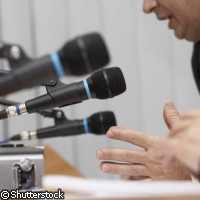Scientists' contacts with media mostly positive, survey reveals
Scientists and journalists get along much better than the stereotypes would have us believe, according to new research published in the latest edition of the journal Science. Surveys of researchers in five countries reveal that interactions with the media are relatively common, and 57% of those polled said they were 'mostly pleased' with their most recent experience of working with the media. In comparison, just 6% described themselves as 'mostly dissatisfied' with the experience. 'Previous studies of the science-media interface mostly focused on the question of why this relationship of scientists and journalists is so difficult,' commented Professor Hans Peter Peters of the Jülich Research Centre in Germany who led the research. 'Our results now say you should turn the question around.' The researchers surveyed 1,354 scientists from the fields of epidemiology and stem cell research in France, Germany, the UK, Japan and the US. Participating scientists were quizzed on the extent of their interactions with the media, the success of these interactions, and the impact of media work on their scientific careers. The first surprise was that the level of interactions with the media was relatively high; almost two thirds of those polled had been interviewed by journalists at least once in the previous three years, and almost half of these had been interviewed more than five times. The scientists who had had the most contacts with the media tended to be those in leadership positions. 'Being a leading researcher now requires a readiness to liaise with the mass media,' explained Professor Peters. 'In other words, it is not left up to the discretion of each scientist as to whether they want to forge links with the media. In certain positions and situations, it is expected of them.' The second surprise was the fact that most of the scientists were happy with the outcomes of their contacts with the media, with just 6% saying they were 'mostly dissatisfied' with their latest media experience. The scientists also overwhelmingly agreed with statements such as 'the journalist asked the right question'; 'the journalist really listened to me'; and 'my research was well explained'. In contrast, they disagreed with more negative statements like 'I was treated with little respect'; 'my statements were distorted'; and 'important information was omitted'. The scientists' main motivation for interacting with the media was their desire to boost the public's appreciation and understanding of science. Nevertheless, almost all of the respondents said they remained concerned by the lack of control they had over the outcomes of their interactions with the media, with 90% citing the 'risk of incorrect quotation' and 80% highlighting the 'unpredictability of journalists' as potential problems. The survey also investigated the impacts of media work on a scientific career. Here, almost half said that working with the media had had a 'mostly positive' impact on their career, while just 3% found the impacts to be 'mostly negative'. Few differences were seen between the countries; the researchers attribute this to the international nature of the cultural norms of science and to similar structural demands in democratic knowledge societies caused by the central function of the mass media for the self-regulation of society 'I have often heard researchers tell stories of someone they know having a bad time with the media,' commented Professor Steve Miller of University College London in the UK, one of the authors of the paper. 'So I was really surprised when our survey showed that, actually, biomedical researchers on the front line of public interest were largely pleased with their own interactions with journalists and broadcasters. 'It just goes to show, you should not believe the horror stories; journalists don't routinely eat scientists for breakfast,' he quipped. The research was funded by the German Federal Ministry of Education and Research (BMBF) within the research initiative 'Knowledge for decision-making processes - research on the relationship between science, politics and society'.



